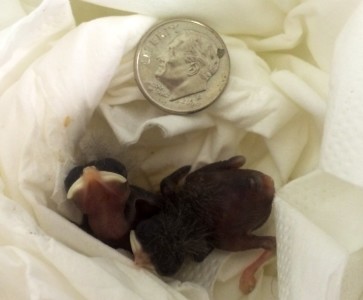 Leave Fledglings Alone.
Leave Fledglings Alone.
During the spring and summer you will probably see quite a few baby birds hopping around on the ground. These are most likely young birds who are learning to fly, also known as fledglings. Fledglings get their name because they are at the stage where their feathers and wing muscles are developed enough for them to begin flying.
If you see a fledgling it is best not to interfere unless the bird is in danger. Occasionally, a fledgling will practice flying in the middle of the street or near a lurking cat. In those instances it is alright to move the bird as long as you try and put it as near to where you found it as possible.
When To Re-Nest Baby Birds.

If you find a very young bird with little or no feathers the best thing to do is to try and reunite it with its mother. Baby birds have the greatest chance of survival if they are raised by their parents. If you can see the nest the baby fell from, simply place the baby back in the nest and observe from a distance. The parents will usually return within twenty to thirty minutes.
If you cannot see the original nest you can make a substitute nest by poking holes in the bottom of a margarine tub or use a small wicker basket. Line the substitute nest with dry grass, pieces of the original nest, or pine needles and hang it from the original tree or a nearby tree.
It is important for baby birds to be warm. If the baby is cold, make a small heating pack by placing uncooked rice or bird seed in a sock and warming it in the microwave for 20-30 seconds. You can wrap the sock in a soft towel and place it next to the baby bird to warm it up before returning the bird to the nest.
If the parents do not return for the baby call a wildlife rehabilitator. Do not attempt to give the baby bird any food or water.
How Do I Know If The Bird Has Been Orphaned?
In most cases, baby birds you find on the ground are not orphans. The parents are usually keeping an eye on it from close by. A good rule of thumb is to wait twenty minutes and see if the mother comes back. Be sure to watch from a distance because the parents will not return if you are too close.
A baby bird needs to be rescued for the following reasons:
- The young bird is in immediate danger.
- You see blood or other signs of injury.
- It is cold, weak, or shivering.
- It has been in a cat’s or dog’s mouth.
To learn more about what to do if you find a baby bird, click here.



That’s way the beestst answer so far!